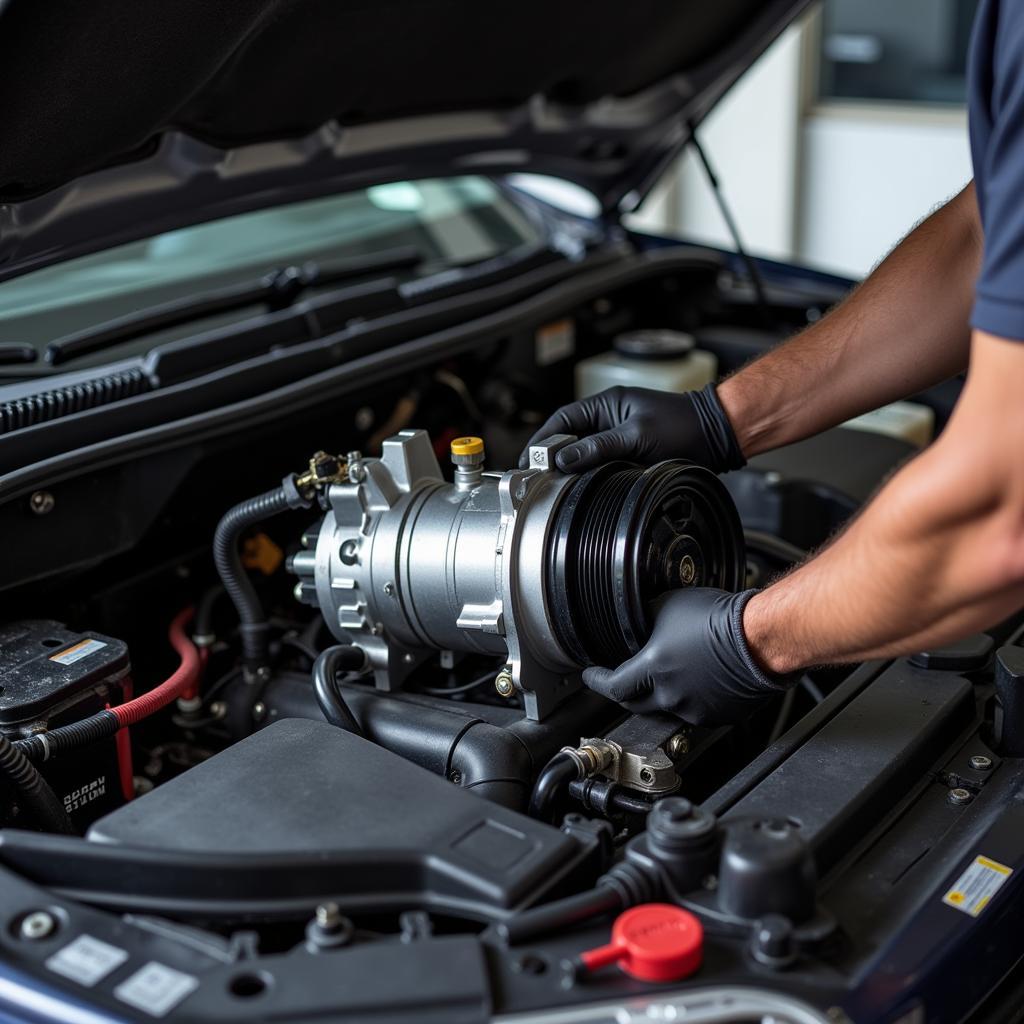Trying to stay cool this summer but your car AC is blowing hot air? You’re not alone. A broken car air conditioner is a common problem, and unfortunately, it’s not always a cheap fix. How much cost to fix car air conditioner depends on a few factors, but we’ll break it all down for you.
Common Car AC Problems and Their Costs
Before we dive into the specifics, let’s look at some of the typical culprits behind a malfunctioning car AC and their associated repair costs.
Refrigerant Leak
One of the most common issues is a refrigerant leak. This can occur over time due to wear and tear on hoses and seals.
Average Cost: $150 – $800
Why the wide range? Locating the leak is often the most time-consuming part of this repair, and labor costs vary.
Compressor Failure
The compressor is the heart of your AC system. When it fails, your AC won’t blow cold air at all.
Average Cost: $400 – $1200
Compressor replacement is a significant repair as it involves a costly part and labor-intensive work.
Condenser Issues
Your car’s condenser looks like a radiator located at the front of your vehicle. It helps cool the refrigerant. If it’s damaged or clogged, your AC efficiency will take a hit.
Average Cost: $200 – $500
Evaporator Problems
Ever noticed a strange smell when you turn on your AC? That could be your evaporator, which is responsible for cooling the air inside your car. If it’s leaking or clogged, it can lead to unpleasant odors and reduced cooling.
Average Cost: $500 – $1000
This is another labor-intensive repair as the evaporator is often located behind the dashboard.
 Mechanic replacing a car AC compressor
Mechanic replacing a car AC compressor
Factors Affecting Car AC Repair Costs
Now that we’ve covered some common repairs, let’s discuss the variables that influence the overall cost:
- Make and Model: Just like any car repair, the make and model of your vehicle play a role in pricing. Luxury or imported vehicles often come with higher repair costs.
- Labor Rates: Mechanic labor rates fluctuate depending on your location and the shop you choose.
- Parts Quality: You’ll typically have a choice between OEM (Original Equipment Manufacturer) or aftermarket parts. OEM parts are often more expensive but may come with a warranty.
- Problem Severity: As we’ve seen, a minor leak is less expensive to address than a complete compressor failure.
“Many times, regular car AC maintenance can prevent costly repairs down the road,” says John Miller, a seasoned automotive technician with over 20 years of experience. “Simple checks like inspecting for leaks and changing the cabin air filter can go a long way.”
How to Save Money on Car AC Repairs
Nobody likes unexpected car expenses. Here are a few tips to keep in mind:
- Shop Around: Don’t be afraid to get quotes from several mechanics or repair shops.
- Ask About Warranties: Inquire about warranties on both parts and labor. This can protect you from additional costs if issues arise after the repair.
- Consider DIY for Simple Fixes: If you’re mechanically inclined, some AC fixes, like recharging the refrigerant, can be done at home with the right tools and knowledge. However, proceed with caution and refer to your car’s manual.
Car air con leak fix is a common DIY repair job. However, be sure you’re confident in your abilities before attempting any repairs yourself.
When to Seek Professional Help
While some minor AC issues can be addressed with DIY solutions, there are times when it’s best to leave it to the pros. If you’re experiencing any of the following, schedule an appointment with a qualified mechanic:
- Your AC isn’t blowing cold air at all
- You notice a strong, unusual odor when running the AC
- You suspect a major component like the compressor has failed
“Attempting to repair complex AC problems without the proper knowledge and tools can lead to further damage and higher repair costs in the long run,” advises Miller.
FAQs About Car AC Repair Costs
Here are answers to a few frequently asked questions:
Q: How often should I get my car AC serviced?
A: It’s generally recommended to have your car AC system inspected annually, ideally in the spring before the hot weather arrives.
Q: Can I drive my car with a broken AC?
A: Yes, but it’s not ideal, especially in hot weather. Not only will your comfort be affected, but driving with a broken AC can also put extra strain on your engine.
Q: How can I tell if my car AC needs refrigerant?
A: If your AC isn’t blowing as cold as it used to or if you notice a hissing sound when it’s running, these could be signs of a refrigerant leak.
Keep Your Cool Without Breaking the Bank
Dealing with a broken car AC is never fun, especially during the peak of summer. By understanding the factors that influence repair costs, knowing when to seek professional help, and taking preventative measures, you can keep your cool without breaking the bank.
Need help with your car AC? Contact AutoTipPro at +1 (641) 206-8880 or visit our office at 500 N St Mary’s St, San Antonio, TX 78205, United States. We’re here to keep you comfortable on the road.






Leave a Reply